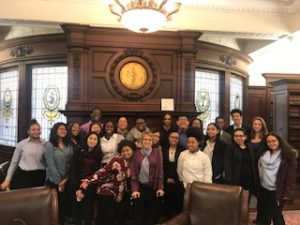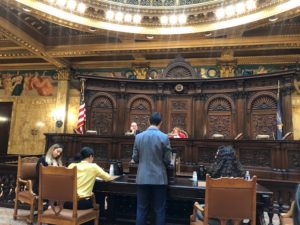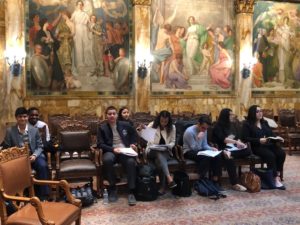From Courts to Classes: Justice Richter’s Commitment to Education Equity

This year, PENCIL is virtually honoring the Partnership between Justice Richter and the High School for Law, Advocacy, and Community Justice (LACJHS) with the Veteran Partnership Award. Justice Rosalyn H. Richter is one of the nation’s earliest out LGBTQ+ appellate judges who has a stellar record in advocating for inclusion and greater civility.
She spearheaded the mandatory Diversity, Inclusion, and Elimination of Bias requirements for members of the New York Bar. She also recently won the Dan Bradley Award, National LGBT Bar Association’s highest honor, for her incredible work in the field.
The goal of PENCIL’s partnership program between Justice Richter and LACJHS is to expand the students’ exposure to careers in law. Through a mock appellate court project, students in Ms. Christine Fryer’s 10th grade History class develop problem solving, critical thinking, and communication skills.

Students with Justice Richter during mock appellate court sessions
We spoke to Justice Richter about her commitment to PENCIL and the students we serve at the High School for Law, Advocacy, and Community Justice.
When did you start working with PENCIL?
So, it was at least five years ago. I heard about the Principal for A Day program a couple of years before that and was thrilled, but I only got involved with LACJHS through the PENCIL partnership about five years ago.
Are there any student interactions you remember in particular?
I have three!
The first that comes to my mind is a student who contacted me and said that he wanted to become a prosecutor. He was a young man of color like most students at LACJHS and said that he had never really thought about becoming a prosecutor before the externship.
He said he had a completely different view of the role than what it really was. He was motivated to try and get better grades to qualify for a college scholarship, and he did! I don’t know if he still wants to be a prosecutor but it stayed with me because this kind of exposure makes students think — not just about being a prosecutor — but about the range of opportunities that maybe they’ve never heard of before.
Wow. That’s a great example of a PENCIL success story. You said you had three stories, right?
Yes. A few years ago, I met a student who identified as non-binary and queer. We had a speaker come and talk about the legal issues around gender and sexual orientation in part because Ms. Fryer (the teacher at LACJHS who supports the PENCIL partnerships) said several students in the school were trying to figure out their identity and that really stuck with me.
The fact that the school, PENCIL, and the teacher all recognized the need for this is essential and quite moving honestly. It was vital for me to help them understand the role of the legal system in protecting individual rights. So it’s not just about someone’s identity but helping them see how the larger society fits into this and to talk to them about tolerance.
That is something I would want to learn about too. Let’s hear your third story. Can’t wait.
We speak about human rights issues from a legal perspective at times. Several students share their experiences with stereotypes around their race or religion and how they feel they’re discriminated against because people make assumptions. Not too long ago, a young Muslim student spoke about how people perceived her differently because she wears a hijab. And it was just very moving to me that students can make connections between complex issues through personal experiences.

Have recent tragedies shaped those discussions in any way?
The work that we’ve been doing these past two weeks is trying to figure out where “pain” fits in our discussions. I think having Ms. Thomas who is our partner staff person at PENCIL and who is a woman of color, was really helpful this semester as the students journeyed through their struggles around race and color since I’m not a person of color.
I think, you know, that was really meaningful to me to be able to have someone who has experienced what students are struggling with and to provide a platform also for them to share and hear adults talking about these issues.
Both, myself as a person who is White and Ms.Thomas as a woman of color having a constructive conversation around race can be something the students can model in their interactions. It helps them with the question “How do you talk about these things with people who are different than you?”
So that was about this week’s class which is related to my next question: How has virtual volunteering been different from volunteering on-site?
So some of the students don’t have a space of their own to study in or work. They’re working in small quarters. That’s something I have observed volunteering virtually — the different challenges because you can see the disparities visually.
On the other hand, I’ve seen students conquering technology and learning quickly. But some students don’t want to turn on their video cameras, and I guess because they’re self-conscious about how they appear on the screen and also concerned about their background and spaces they occupy.
In our PENCIL sessions, we have talked about video etiquette; we have really been encouraging them to learn how to navigate this and how to talk on video because that may be the future.
Is there something you wish you could do more for the kids?
Provide them with more financial resources or technology. It just seems to me, and it’s a follow-up to what we’ve been talking about a lot recently that they (public school students) just don’t have, you know, the technology that maybe some of us take for granted.
Even good internet connections. All of that, I think is really challenging. It’s not something that I could do for them alone, but if I could, I think that would be extremely helpful.
I also wish we could send young people to work this summer like every other summer.
PENCIL is still placing students in virtual internships, but we are also encouraging partner companies to get involved.
So, my last question is: what is one advice you have for students currently in High School dealing with all that is happening?
I think it’s don’t be distracted. I know we are going through a public health crisis and life crisis but try to keep your focus on your school and the future. This year, I did see and acknowledge that some students just got so overwhelmed by what was going on that they weren’t able to focus.
Especially with academics, try as hard as you can to do well. Life presents its challenges, but when you are young, it’s hard to see past it. Young people live in the moment. But soon they are going to want to go to college and if they didn’t do their schoolwork, they might regret it.
Rashida Thomas, our program manager who nominated Justice Richter also shared her thoughts:
Justice Richter has lent continuous support to this partnership toward the students at LACJ being able to meet the goals of developing awareness and skills in problem solving, critical thinking, and communication. This year students were guided in dissecting case law with guidance from Justice Richter and her team which included Justice Ellen Gesmer and students from New York Law School. When the partnership transitioned to a virtual format, discussions were held on legal statutes as well as current events. Justice Richter’s dedication to enhancing the education of students through experiential exercises has been apparent from the outset and persisted through each partnership interaction. Because of her personal investment, the partnership has been successful and of great value to students.
